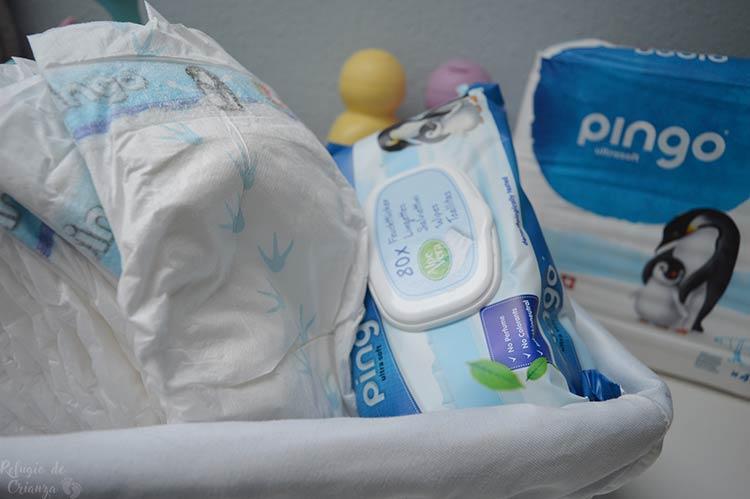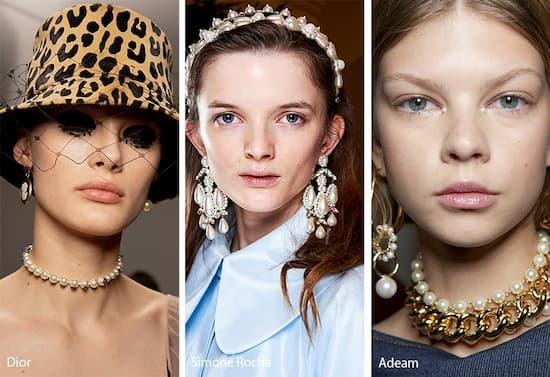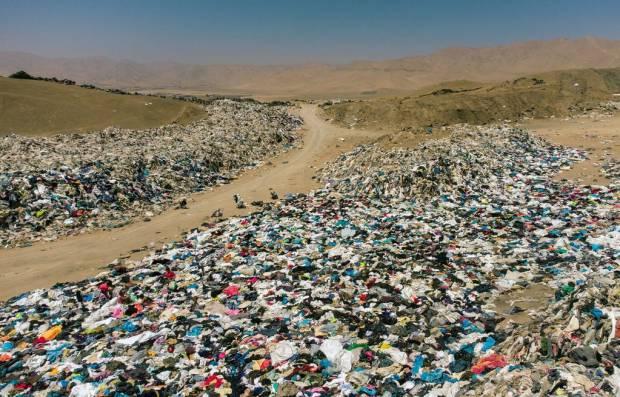Put on, remove, wash, dry in the sun or in the heat of the stove and wrap the baby again. This was the cycle that our grandmothers and mothers followed until the mid-'90s to leave babies clean after changing their diapers.
And nobody thought it was hard work, because little or nothing was still heard about disposable diapers.
The new times accustomed us to the ease of throwing everything away as soon as it gets dirty and the daily whirlwind meant that not only diapers became disposable. With the “put on, remove and throw away” phenomenon, baby skin conditions began to arrive, such as diaper rash and other irritations that are a daily ordeal with which many mothers must struggle, whose children never fully heal. .
But, in the way of continuing to prefer what is quick and easy, we forget basic issues, such as that if the baby gets irritated it is because the skin is not breathing, wrapped in plastic most of the day.
If a disposable diaper takes 500 years to break down, we can't even imagine how harmful it is to the planet if we take into account that a single newborn baby is changed eight to 10 times a day, a frequency ranging decreasing as it grows.
All this immeasurable amount of garbage ends up in landfills and the sea, thus contaminating the waters, a fundamental part of our planet.
The innovative approach of thinking about the environment when taking care of our babies is closer than you imagine. In Paraguay we already have references that have translated their satisfactory experience with reusable diapers into a commercial initiative, thus offering other mothers the possibility of living this adventure of recovering their friendship with ecology, and, incidentally, saving an unimaginable amount of money. in the acquisition of disposable diapers.
Although it is the same concept that our grandmothers used in ancient times, reusable diapers return as a renewed, modernized and recharged trend, thinking not only about the cleanliness of the baby, but also about the health of their skin and the Environmental care.
Jessica Céspedes Narváez, mother of two children -4 and 1 and a half years old- and with a baby on the way, has been importing and selling organic diapers since November 2016, and currently imports them directly from China.
She does not deny that when she learned about reusable nappies, through a German friend, her first incentive was to save. “I tell you the truth: my economy was hard and when I realized that for what I spent on a pack of disposable diapers a week, I was buying an ecological reusable diaper until my baby got out of diapers, I realized that the savings are forceful”, said the owner of the business called Ecochiqui's Colitas de Tela Paraguay, a virtual store that is managed exclusively through orders on its Facebook page and has a delivery service.
After realizing the dramatic savings of using reusable diapers and dramatically improving her finances, Jessica also began to feel relieved that her baby was no longer constantly fussing and her house was no longer littered with garbage produced by diapers.
You may be wondering if this type of diaper could work for you, because you may think that washing will represent a sacrificial task that you will not be able to fulfill considering the fast pace of life. But it is not as difficult as you imagine, since modernity has brought with it cleaning facilitators and alternatives that make the task much easier compared to the hard work that our grandmothers had to do with the fluke.

Materials also improved in quality. The common fabrics to which our grandmothers crocheted edges give way to first-quality fibers that are breathable and beneficial to baby's skin.
Reusable diapers are made of PUL (laminated polyurethane), a waterproof material that takes 50 years to degrade, resulting in less harmful to the planet.
And, although it is hard to believe, a single reusable diaper that you buy can last from birth to toilet training, approximately two and a half years old, because they are one size, that is, they count with little buttons that adapt to the baby's waist as it grows.
Even, explains the expert on the subject, they are inheritable from a next little brother. It only depends that they are well cared for and the main thing for this is to know how to wash them correctly.
“The diapers are prepared to be machine washed, with that there is no problem. What you do have to keep in mind is to avoid bleach and fabric softener, because they weaken the fibers of the material. To clean, ecological diapers only need water, neutral soap and sun”, details Jessica Céspedes.
Yes, we imagine that certain difficulties will come to mind, such as: “What happens when we go out somewhere and the baby needs a change? I can't be washing a diaper anywhere else. Will I have to carry dirty diapers?”
These questions are answered by our expert mom Jessica, who assures that it is feasible for a mom to manage exclusively with usable diapers throughout the baby's early childhood.
“With my daughter, from day one until she got out of diapers, we use only organic ones. Thank God, there are already accessories such as bags to store dirty diapers and liner rolls, which are facilitators of washing, because when you go out you don't carry the waste, but rather throw it down the toilet. They are super practical”, he says.
How to draw an angry shark 🦈 https://t.co/4BWpmUZimi
— Lmhaydi 🎗 Sat Jul 24 14:15:10 +0000 2021
But let's stop for a second to explain what the liners consist of. They are fine biodegradable bamboo cloths that adhere to the cloth diaper and are in direct contact with the baby's skin. In this way, everything that costs to clean remains on top of the roll and is discarded instantly, leaving the cloth diaper almost completely clean, so as to put it later in the washing machine with peace of mind.
These little bamboo cloths are for optional use, because the diaper is also prepared to be used alone. But since it makes washing easier, Jessica tells us that many parents choose to include it in the purchase. Since they are made of bamboo, a natural material, they degrade in just 50 days. “There are no excuses for not using them”, adds our interviewee.
Let's get to the painful and interesting subject: How much money can be saved by choosing ecological diapers?
A brief consultation of prices in supermarkets shows us that a package of 40 diapers is valued at an average of G. 90,000. This package lasts a maximum of two weeks for a newborn. That is, we need two of these packages to reach the month, so we end up spending G. 180,000 or more, depending on the brand.
Now, let's multiply G. 180,000 by twelve months and we will obtain as a result that in one year we will have already spent G. 2,160,000 just on diapers.
Now let's do a comparison. The current price that is handled in the market to acquire an ecological diaper is G. 60,000 per unit, already with its absorbent included.
The expert on the subject explains that the mother of a newborn needs an average of between five and 15 diapers to manage comfortably when changing and not having to wash them all the time. "The newborn is changed between eight and 10 times a day, so you have to have between five and 10 clean diapers available for changing," explains Céspedes.
So, Jessica specifies, the investment you would need to make if you decide to be a user of ecological diapers for a kit of 10 diapers is G. 550,000, because when you buy a certain amount, you give a small discount to your customers, reducing the unit cost to G. 55,000.
With this investment, which may be a bit hard to do at once, one should consider that one can handle the baby for as long as they wear diapers, since they can only be washed and reused. Also, of course, only the waist size is adjusted with the built-in buttons.
“There are mothers who have up to 25 diapers for their better comfort and not to wash all the time, but it is the decision of each mother”, shares our interviewee, who points out that there are parents in Paraguay who have completely stopped spending in conventional diapers.
There is one very important factor to keep in mind: Babies have slower replacement rates as they get older. That is, if your child is already 10 months old and you are just starting to try organic diapers, you should calculate how many diapers the baby uses per day and multiply that amount by two. Thus, if your baby uses five diapers a day, you only need 10 ecological diapers to manage comfortably.
We turned to the opinion of a pediatrician, Dr. Julia Acuña, to find out what medicine thinks about this innovative trend.
Dr. Acuña stated that she recommends the use of cloth diapers to her patients, since "they are made from a set of biodegradable materials and, unlike common disposable diapers, they completely exclude the use of fragrances synthetics and chemicals. For this reason, they not only reduce the environmental impact, but also imply greater and better care for the baby's skin," said the doctor.
Among other advantages, the doctor mentioned that reusable diapers "are softer than common disposable diapers, since they are made mostly from bamboo pulp, they absorb moisture very well and do not accumulate bad odors thanks to that bamboo fabric contains antibacterial agents”, the pediatrician specified.
In addition, the specialist highlighted that ecological diapers allow good skin perspiration, "thus, they keep the baby cool both in winter and in summer."
And for allergic babies the advantage is even greater. As emphasized by Dr. Acuña, washable diapers “are hypoallergenic, which makes them perfect for sensitive skin. In addition, those currently on the market are easy to wash and do not need to be boiled," he added.
The pediatrician commented that among her patients there are a significant number of mothers who exclusively use organic diapers.
“It seems to me a very valid option, taking into account that a child needs an average of 5,000 disposable diapers for the first two years of life and waste represents the third largest item (after newspapers and drinks and containers of food) in the flow of urban solid waste”, highlighted the doctor.
The choice is always left to the free will of the parents. There are those who definitely do not want to know anything about washing diapers and there are those who opt for this alternative somewhat forced by the pediatrician, since the baby is very allergic and definitely cannot be in contact with plastic. It does not hurt to try the trend at least once before discarding it and, why not, start using them interspersed with conventional diapers until corroborating how many benefits they bring in our daily bustle with the little ones in the house.


